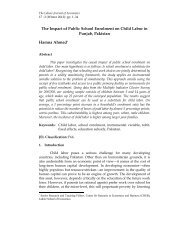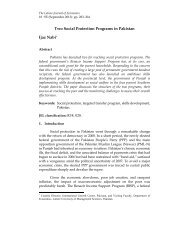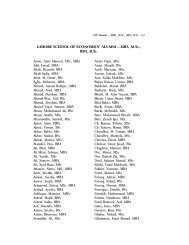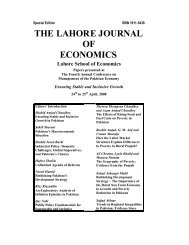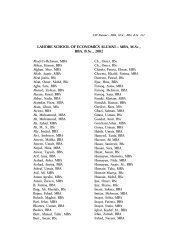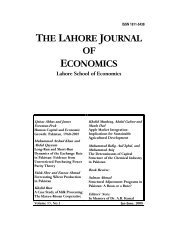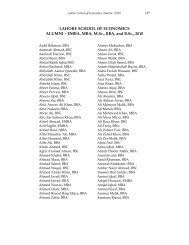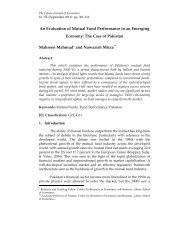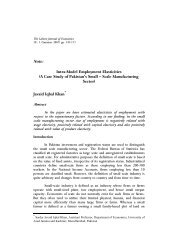Special Edition-07.pdf - Lahore School of Economics
Special Edition-07.pdf - Lahore School of Economics
Special Edition-07.pdf - Lahore School of Economics
You also want an ePaper? Increase the reach of your titles
YUMPU automatically turns print PDFs into web optimized ePapers that Google loves.
Implications for Economic Reforms in Pakistan and other Southern Countries 161<br />
<br />
All prices are in rupees per 40 kg.<br />
<br />
Procurement in million tonnes.<br />
▲ Procurement in million tonnes<br />
<br />
Procurement as percentage <strong>of</strong> total production.<br />
♠ No support price was announced for 1998-99 wheat crop.<br />
In all fairness, the figures listed in Table-5 show that APCom has<br />
been tinkering rather than fine tuning while calculating the support price<br />
mark up. The <strong>of</strong>ficial publications do provide the elaborate goals <strong>of</strong> the<br />
support price, but the information on its mechanism and implementation is<br />
very general and extremely vague. Also, empirical evidence shows that there<br />
has been a huge transfer <strong>of</strong> welfare gains from producers to the consumers<br />
(Ashfaq et. al. 2001; Niaz 1995). It may therefore be concluded that even<br />
during the first reform period, agricultural policies have been penalizing<br />
rather than rewarding the farmers in Pakistan.<br />
Part III<br />
The shortcomings <strong>of</strong> reform efforts by developing countries such as<br />
Pakistan are <strong>of</strong>ten escalated in a world <strong>of</strong> unequal trade partners, as the<br />
huge agricultural subsidies received by the developed countries’ farmers<br />
encourage overproduction and distort trade by making farm goods artificially<br />
cheap internationally.<br />
Farm protection is ubiquitous in developed countries. It has a<br />
formidable history which dates back to the Corn Laws that had protected<br />
British Farmers from imports <strong>of</strong> foreign grain for 200 years. 8 After an ugly<br />
struggle, the British Parliament eventually voted for reform in 1846.<br />
Powerful countries have found a pretext in every age to protect their<br />
farmers. In 19th century Europe, the pretext was unfair competition from<br />
cheap American and Australian imports. In the 1930s it was farm poverty.<br />
After the Second World War it was food security and later on it became<br />
preservation <strong>of</strong> the rural character. 9 With advancements in communication<br />
technology, the issue <strong>of</strong> farm support has now become a potent emotional<br />
and political force the world over. In the EU and US, the farm lobbies wield<br />
influence out <strong>of</strong> all proportions to the share <strong>of</strong> the farm sector in these<br />
countries’ GDP and the labor force.<br />
8 Adam Smith devoted Chapter 5 <strong>of</strong> Book IV to subsidies, called “bounties” in his time.<br />
Although he discussed bounties in the context <strong>of</strong> foreign trade, the main issues are the<br />
same (see Smith, 1776, pp. 398-408).<br />
9 See, ‘A Survey <strong>of</strong> Agriculture’, The Economist, December 12, 1992.



